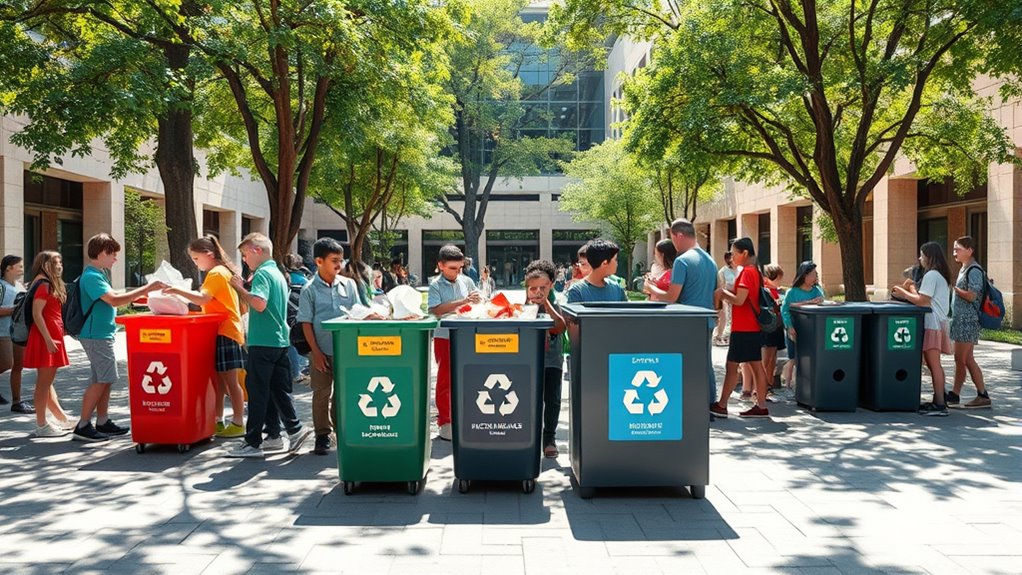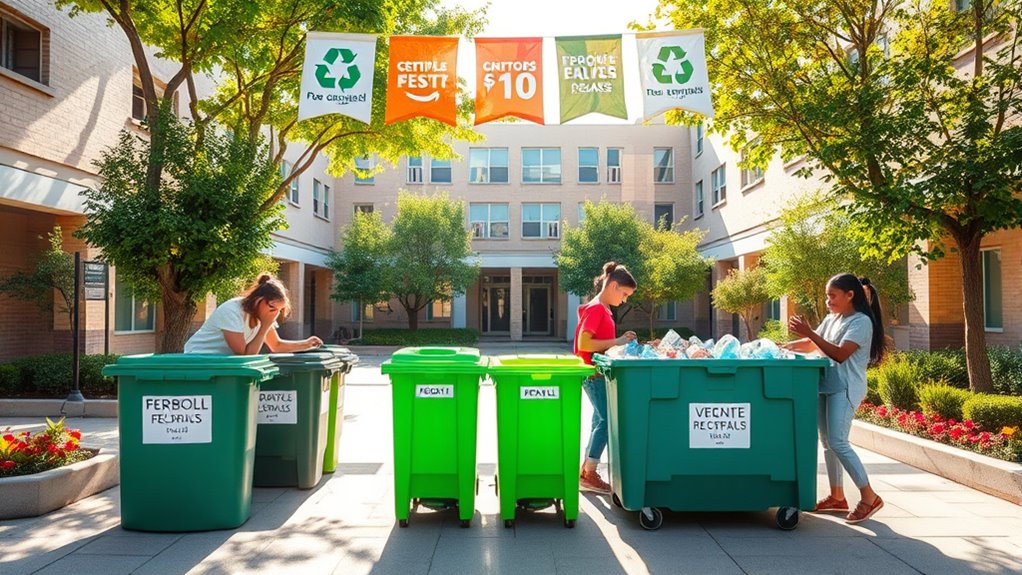Implementing recycling and composting programs on campus can greatly cut down waste and promote sustainability among students and staff. By setting up clear recycling stations and encouraging composting of food scraps and yard waste, you divert materials from landfills and create valuable compost for gardens. Educating your community about responsible waste habits and fostering student-led initiatives enhance these efforts. Keep exploring how to develop effective programs that make a real difference.
Key Takeaways
- Implement accessible recycling stations for paper, plastics, and metals to encourage proper waste separation.
- Establish composting bins for organic waste like food scraps and yard waste to reduce landfill contributions.
- Conduct waste audits to identify high-waste areas and optimize recycling and composting practices.
- Educate students and staff through workshops and informational materials to promote participation in waste reduction programs.
- Promote reusable containers and sustainable packaging to minimize single-use plastics and minimize waste generation.

Have you ever wondered how much waste your school produces each day? It’s a question that often goes unnoticed, but understanding the amount of waste generated is the first step toward making a real difference. Conducting a waste audit is an effective way to get a clear picture of what’s being thrown away, from paper and plastic to food scraps. During a waste audit, you’ll sort through waste items to identify patterns and pinpoint areas where waste is most prevalent. This process not only highlights the volume of waste but also reveals opportunities to reduce it through alternatives like sustainable packaging. For example, switching from single-use plastics to reusable containers and wrapping can considerably cut down on waste. These small changes, prompted by the insights from a waste audit, help your school adopt more sustainable practices, reducing environmental impact and fostering responsible habits among students and staff. Additionally, understanding projected waste volume can aid in designing more effective waste management strategies tailored to your school’s needs. Implementing recycling and composting programs on campus goes hand in hand with this awareness. Recycling encourages everyone to separate materials such as paper, plastics, and metals, which can then be processed and reused rather than ending up in landfills. It’s important to set clear, accessible recycling stations around the school, making it easy for students and teachers to participate. Composting, on the other hand, handles organic waste like food scraps and yard waste, turning it into nutrient-rich compost that can be used in school gardens or landscaping. By establishing composting bins in cafeterias and around campus, you help divert a substantial amount of waste from landfills while creating a valuable resource for the school community. Education plays an essential role in the success of these programs. Informing students and staff about the benefits of recycling and composting creates awareness and encourages participation. You can organize workshops, distribute informational flyers, or even start a student-led sustainability club to keep the momentum going. Promoting the use of sustainable packaging, such as reusable lunch containers and water bottles, complements these efforts, reducing waste at the source. The combination of a waste audit, sustainable packaging, and extensive recycling and composting programs can transform your school into a model of environmental responsibility. It’s not just about managing waste better; it’s about fostering a culture that values sustainability and conservation. When everyone pitches in, your school can drastically reduce its waste footprint and inspire other institutions to follow suit. A better understanding of environmentally friendly waste reduction methods can further enhance these efforts, especially when supported by community involvement and ongoing education initiatives.
Frequently Asked Questions
How Can Students Effectively Promote Recycling Initiatives?
To promote recycling initiatives effectively, you can leverage peer influence by encouraging friends to participate and setting a positive example. Use social media campaigns to spread awareness and motivate others to join your efforts. Share success stories, create engaging content, and organize events that highlight the benefits of recycling. By actively involving your peers and utilizing social media, you’ll inspire a campus-wide movement toward sustainability.
What Are the Costs Associated With Implementing Composting Programs?
When you consider the costs of implementing composting programs, you need to focus on budget planning for effective waste management. Expenses include initial setup, such as bins and signage, and ongoing costs like maintenance and staff training. While there’s an upfront investment, many schools find that these programs reduce waste disposal fees over time, making them a cost-effective addition to your waste management strategy.
How Do Schools Measure the Success of Waste Reduction Efforts?
You assess your waste reduction efforts by tracking measurement metrics such as the volume of recycled and composted materials and the reduction in landfill waste. Success indicators include increased participation rates, improved waste diversion rates, and positive behavioral changes among students and staff. Regular data collection and analysis help you determine if your initiatives are effective, guiding adjustments to maximize environmental impact and foster a culture of sustainability on campus.
Are There Eco-Friendly Alternatives to Traditional School Supplies?
Did you know that eco-friendly school supplies can considerably cut waste? You can choose biodegradable pens, which break down naturally, or recycled notebooks made from post-consumer materials. These alternatives help reduce plastic pollution and save resources. Switching to these supplies not only benefits the environment but also encourages sustainable habits. So, next time you shop for school supplies, opt for eco-friendly options and make a positive impact!
How Can Waste Reduction Programs Be Integrated Into School Curricula?
You can integrate waste reduction programs into school curricula by developing a sustainable curriculum that emphasizes waste awareness. Encourage students to participate in projects like recycling, composting, and waste audits. Incorporate lessons on environmental impact and responsible consumption into science and social studies classes. This hands-on approach helps students understand their role in reducing waste and fosters lifelong eco-friendly habits, making sustainability a core part of their education.
Conclusion
By participating in recycling and composting programs, you can markedly cut down school waste. Did you know that schools implementing these programs have seen waste reduction rates of up to 50%? Your efforts make a real difference in creating a cleaner, greener campus. Every bottle you recycle and compost bin you fill helps protect the environment and sets a positive example for others to follow. Together, you can make a lasting impact on your school’s sustainability.









